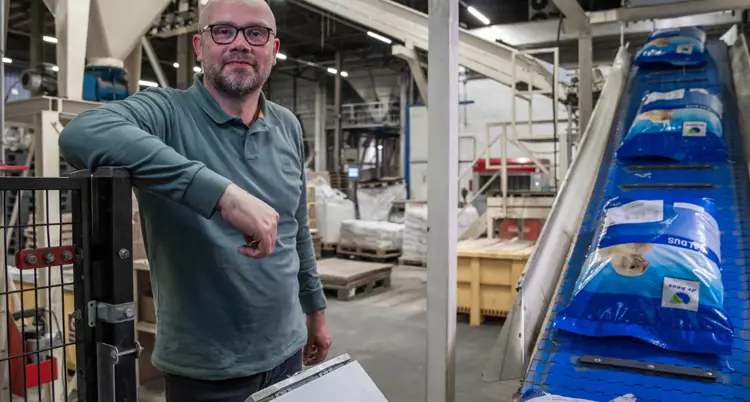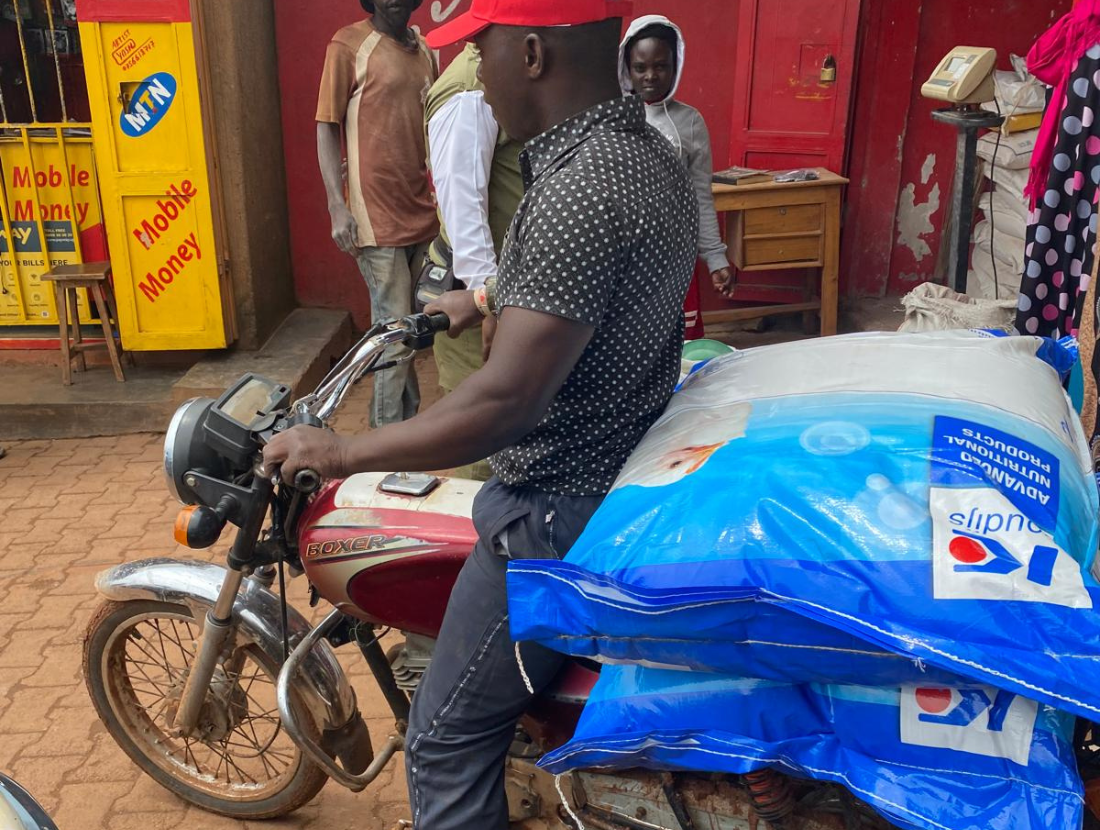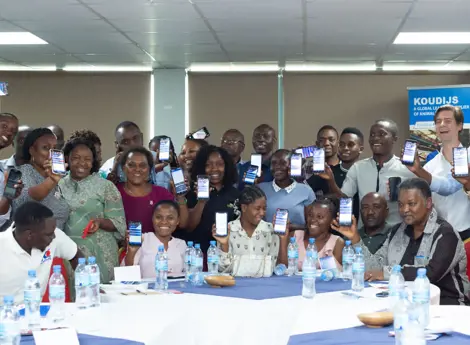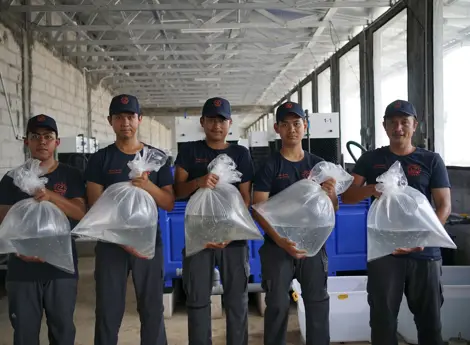Partnering to produce more sustainable product packaging
As part of its overall sustainability programme, Royal De Heus is committed to promoting responsible waste management by reducing and recycling resources in its supply chain. This includes materials used in the company's product packaging. Over the last 15 years, the company has developed a solid relationship with Royal LC Packaging, a leading producer of safe, reliable and protective packaging for a wide range of products. The two companies continuously work together to develop innovative solutions for product packaging and are piloting a more sustainable feed bag in Ivory Coast.

Procurement Manager Packaging Materials
Balancing protection and environmental impact
Sustainability has always been part of the partners' collaboration with the focus being on minimising the amount of packaging material without sacrificing strength and the quality required to protect the product. "Sustainability in packaging isn't just about using less plastic," says Anne-Corine Vlaardingerbroek, Group Sustainability & Corporate Affairs Manager, De Heus. "It's also about ensuring that packaging can keep the product safe and intact." That's why it's important to choose packaging material that balances minimum environmental impact with maximum product protection. This also contributes to efficient production and lower CO2 emissions.
Technical considerations
In producing packaging - sustainable or conventional - there are many challenges. "As well as focusing on strength and quality, you have to ensure that feed bags work properly with the filling machines. Technical specifications of the bags have to be optimised so that machine output is maximised and loading time of containers is minimised," says Jan van de Werken, Procurement Manager Packaging Materials, De Heus. "You also have to think about what happens to the bag when the product falls downwards into it." LC Packaging and De Heus also have to take into account how the bags will be transported. Whilst they're shipped to overseas destinations in freight containers, they often make the last-mile journey to the farmer on the back of a pick-up truck or a motor scooter, so the bag has to be able to withstand this kind of handling.
Printability and brand perception
Another consideration is printability of the bag material, which is important for branding and marketing. The look of the bag can have a big impact on brand perception, particularly in developing countries like Africa where small changes to the bag's appearance can be seen as indicative of product quality. An unfamiliar colour of stitching or a different shade of white can cause end users to doubt the product's reliability, damaging De Heus' credibility as an animal feed producer. Consistency of appearance is everything. "For a company like De Heus, you need more than just basic printing," says Dennis Palache, Senior Account Manager, LC Packaging, "You need high-standard, full-colour printing with photo quality."
Sustainability in packaging isn't just about using less plastic. It's about ensuring that the packaging can keep the product safe and intact, while balancing minimal environmental impact and maximum protection.
Legislative landscape
There are other challenges in addition to technical and visual considerations. "There are new regulations governing packaging in Europe," says Lotte Mastwijk, Head of Sustainability, LC Packaging. "The EU Packaging and Packaging Waste Regulation will soon be in force. It sets targets to reduce packaging waste overall, and mandates specific requirements for packaging sustainability, including recyclability, recycled content, reuse and minimal packaging. Furthermore, it ensures that Extended Producer Responsibility schemes are rolled out across all EU member states. Each country can implement these schemes in their own way, so we monitor these developments to ensure that we focus on the right innovation approach to reach our sustainability targets."
Local context and approaches
The way different countries comply with sustainable packaging regulations varies considerably. For example, a great deal of packaging is reused in Spain, the Netherlands and the UK, while other countries are looking at a money deposit scheme. "When it comes to sustainable packaging, there's no one-size-fits-all solution," says Anne-Corine. "So we look at the local context and set local goals and targets. We talk to the business units and discuss what the local regulations are and what's feasible and realistic. And then we talk to Jan and LC Packaging: Can we look at recycled content in our packaging and if that's possible, what more can we do?"

Piloting a more sustainable bag
This local approach is how the partners in the Netherlands initiated a pilot project 18 months ago in Ivory Coast. The management of the local business unit in Ivory Coast was interested in participating in sustainable packaging trials, so this was chosen as the test market. The fully controlled pilot focuses on increasing the percentage of recycled material in Koudijs animal feed bags and reducing the amount of virgin material to make them more sustainable. "Together with LC Packaging, we developed bags composed of recycled material to evaluate how they function in the market," says Jan. "The project studies how we can improve the bags' sustainability without affecting product quality, safety, branding and sales." The partners are also looking at the maximum achievable percentage of recycled material without having a negative impact on brand perception and sales.
Developing sustainable packaging means not only focusing on strength and quality but also ensuring that bags work seamlessly with filling machines, withstand transportation challenges, and maintain brand consistency.
Functional, printable, sustainable
The bag being tested in the pilot is partially made from biaxially oriented polypropylene (BOPP), a plastic film that offers high tensile strength, excellent optics and good barrier properties. The bag is composed of multiple layers, including an inner layer containing 30% recycled material. This layered BOPP structure allows the recycled plastic to be added to the bag without significant loss of strength and functionality, which isn't the case with a conventional polypropylene animal feed bag. BOPP is also ideal for printing. Although the use of recycled materials can cause subtle colour changes, like a greyer shade of white, the content of 30% recycled material doesn't have a significant effect on brand image and perception.
Powering success together
Close collaboration between Jan van de Werken (Procurement Manager Packaging Materials De Heus) and Dennis Palache (Account Manager Royal LC Packaging) ensures seamless communication and tailored solutions, driving optimal outcomes for our partners.
Promising initial results
It's difficult to draw firm conclusions on the first results of the pilot, but at this point De Heus and LC Packaging will continue to monitor developments and share further updates and results once the project is complete and the bags are permanently launched on the market.
Confidence and transparency
"This pilot is a great example of how De Heus and LC Packaging work together to find sustainable innovations that will work in the market," says Allard van Asselt, Product Group Manager, LC Packaging. "It also shows the confidence we have in one another. Jan not only talks with us about packaging issues, he also visits our production facilities in India to see how we operate." In the same way, LC Packaging visits the countries where De Heus sells its products to see how the bags are used by customers and therefore the needs may vary per country. "Our collaboration and partnership is all about transparency," conclude Jan and Allard.
This pilot is a testament to how De Heus and LC Packaging collaborate to drive sustainable innovation. Our partnership is built on transparency and mutual confidence, allowing us to create solutions that not only meet environmental goals but also work effectively in the market.
Making a difference globally
"It's great that people at both De Heus and LC Packaging are highly motivated to make a difference in the world," says Anne-Corine. "Assuming the pilot in Ivory Coast is a success, we will have a new more sustainable bag. And then we can look at how we can introduce it to other business units and markets."












